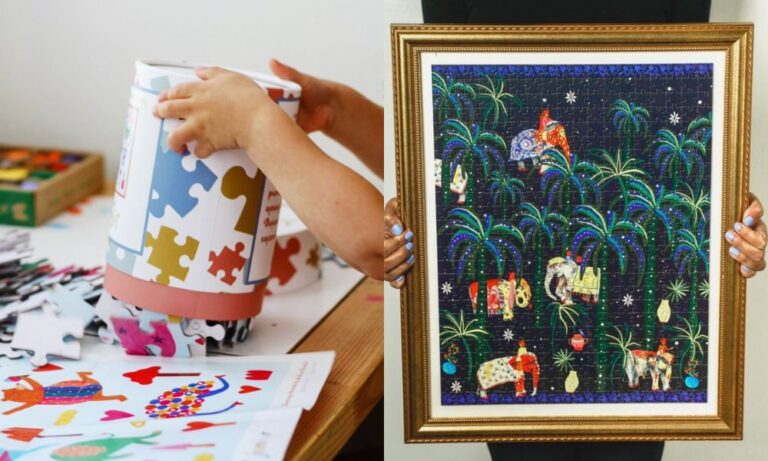
If you have ever turned to interesting jigsaw puzzles to have a fun afternoon, bond with friends, or admire art on one, you might have stumbled upon the work of Jiggy founder Kaylin Marcotte.
The first jigsaw puzzle in the world was reportedly created in the 18th century in London. Since then, the puzzles have spread all over the world, in various shapes and sizes, and have been linked with developing a higher IQ. Today, Marcotte has taken it upon herself to elevate the game and is one of the most successful entrepreneurs.

The Jiggy Founder’s Success Story
Jiggy founder Kaylin Marcotte just wanted to help people manage stress and anxiety by solving the humble puzzle. But when she started looking for good pieces that were as soothing to the eye as to the mind, she found a glaring gap in the market. Most puzzles used stock photography or lacked a certain aesthetic that would engage your senses.
Being the problem solver she is, she came up with her own solution. Marcotte found beautiful art pieces by up-and-coming artists and converted their creations into puzzles. It was the start of a success story.
The Jiggy founder decided to offer art pieces as puzzles, along with glue and a frame. This way, when people completed the task, they could keep the finished pieces as art. She decided to go ahead with her idea, and poured $25,000 of her own savings into the project.
Puzzling Sales and Success
Her venture, Jiggy Puzzles, took off by the end of 2019 and the pandemic helped boost sales as people looked for ways to distress while stuck in quarantine. Jiggy sales soared by 300% to 400% during the pandemic. Each Jiggy puzzle comes in a glass jar that features a work of art by an upcoming female artist. A certain percentage of the sale is redirected to the artist.
To find good artists, the Jiggy founder would scour Instagram and art fairs and choose pieces from their existing portfolios. The secret behind Jiggy’s success story is Kaylin Marcotte’s quiet resourcefulness and eye for detail. As she did not demand commissioned pieces, the process was smoother and artists were also given a portion of the profits.
Marcotte recommends giving jigsaw puzzles a try as they are “a great metaphor for life serving as a symbol of the challenges and obstacles that stand in our way, especially this past year. When you first open a puzzle and all the pieces are scattered and jumbled, by focusing on just one piece, one section at a time we can turn all those fractured pieces into something complete and beautiful. Part of the power of puzzles are the perspective and optimism they represent.”

Leadership Lessons
The Jiggy success originates from Kaylin Marcotte’s drive to find a solution to the problem she identified. As lackluster jigsaw puzzles flooded the market, Marcotte realized that there is a need for quality pieces and capitalized on the opportunity.
Along the way, the founder focused on another neglected group. She sought out up-and-coming artists and featured their works, creating added value and awareness about the art community.
As a startup founder, Marcott built relationships with everyone – from vendors to artists. She also used social media to her advantage and relied on her network to get the word out. Her exceptional networking ability bore fruit as she teased the puzzles on Instagram and everyone wanted in.
Marcott also recommends first-time entrepreneurs to take it slow. While she had no prior experience in designing, she kept her focus on the end product and took her time to build something to her satisfaction.
Benefits of solving jigsaw puzzles
Research has shown that solving jigsaw puzzles daily increases your IQ by around 4 points. It also enhances one’s short term memory and recall.
A puzzle engages both sides of the brain and provides exercise while enhancing creativity and intuition. A jigsaw puzzle will also improve your virtual-spatial reasoning ability.
Solving puzzles enhances our problem solving skills and overall perception and understanding. Studies have also shown that people who regularly solve jigsaw puzzles and the crossword are less likely to fall prey to old age problems like Alzheimer’s, memory loss, or dementia.